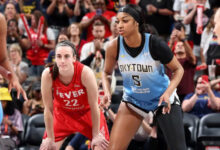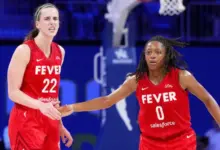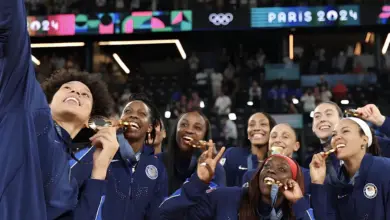Pat McAfee Claims the ‘Universe’ Warned Him to Stop Talking About WNBA Star Caitlin Clark
Pat McAfee Claims the ‘Universe’ Warned Him to Stop Talking About WNBA Star Caitlin Clark
Pat McAfee, known for his fiery commentary and unfiltered opinions, has never been one to shy away from controversy. Whether on his own show or as a guest on others, McAfee has built a reputation for speaking his mind, often pushing the boundaries of conventional sports commentary. However, his recent silence on WNBA rookie sensation Caitlin Clark has raised eyebrows and sparked speculation about the reasons behind it.
The controversy began during a recent appearance on ESPN’s simulcast with Rich Eisen, where the topic of Caitlin Clark came up. McAfee, who is usually quick to offer his take on any subject, suddenly shifted gears and made a cryptic comment that left many wondering what was going on. “Well, the universe told me not to talk about her,” McAfee said. “God came in and was like, ‘You know what, pal? Probably go ahead and stop it.'”
When pressed by Eisen about why the “universe” had advised him to stop discussing Clark, McAfee responded with a characteristic mix of self-deprecation and humor. “The universe tells me this because I’m an idiot, mostly,” McAfee continued. “The reason is because I’m an idiot. I am dumb. And the way I speak, not good. And multiple times God has come in and [said], ‘You need to stop.'”
McAfee’s remarks were clearly meant to downplay the situation, but those familiar with his style knew there was more to the story. The real reason behind McAfee’s sudden reticence on Caitlin Clark dates back to an incident on his show a few months earlier. During a segment where he was discussing the WNBA and Clark’s breakout rookie season, McAfee made a comment that would later come back to haunt him. In his usual blunt style, he referred to Clark as a “white bitch,” a remark that sparked immediate backlash.
The comment was widely condemned as offensive and inappropriate, leading to a wave of criticism from fans, commentators, and even fellow athletes. McAfee, known for his brash and unapologetic persona, found himself in an unfamiliar position: on the receiving end of a public relations crisis. The backlash was significant enough that McAfee felt compelled to issue an apology, a rare move for the outspoken host.
Taking to social media, McAfee addressed the controversy head-on. “I shouldn’t have used ‘white bitch’ as a descriptor of Caitlin Clark,” he wrote. “No matter the context… even if we’re talking about race being a reason for some of the stuff happening… I have way too much respect for her and women to put that into the universe. My intentions when saying it were complimentary just like the entire segment but, a lot of folks are saying that it certainly wasn’t at all. That’s 100% on me and for that I apologize. I have sent an apology to Caitlin as well. Everything else I said… still alllllll facts.”






